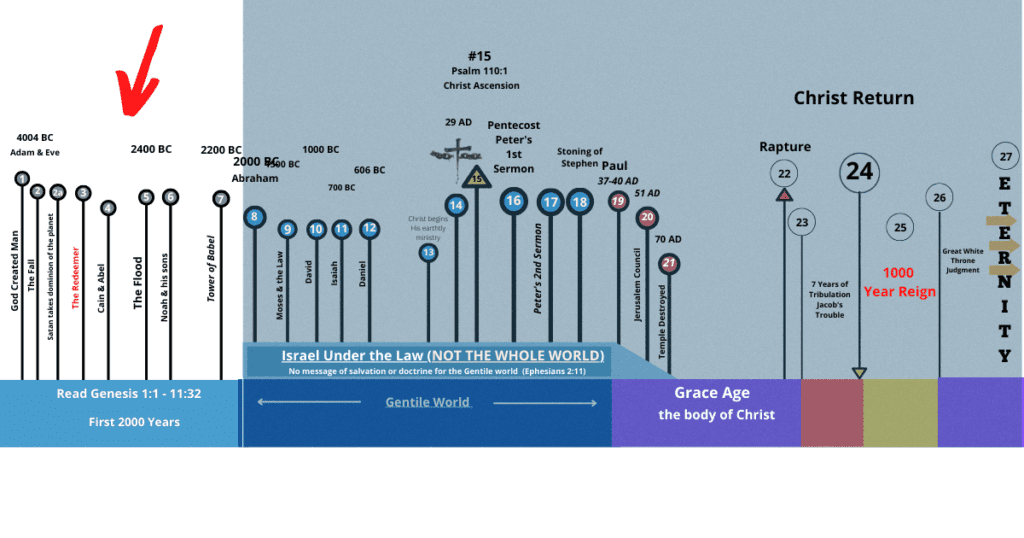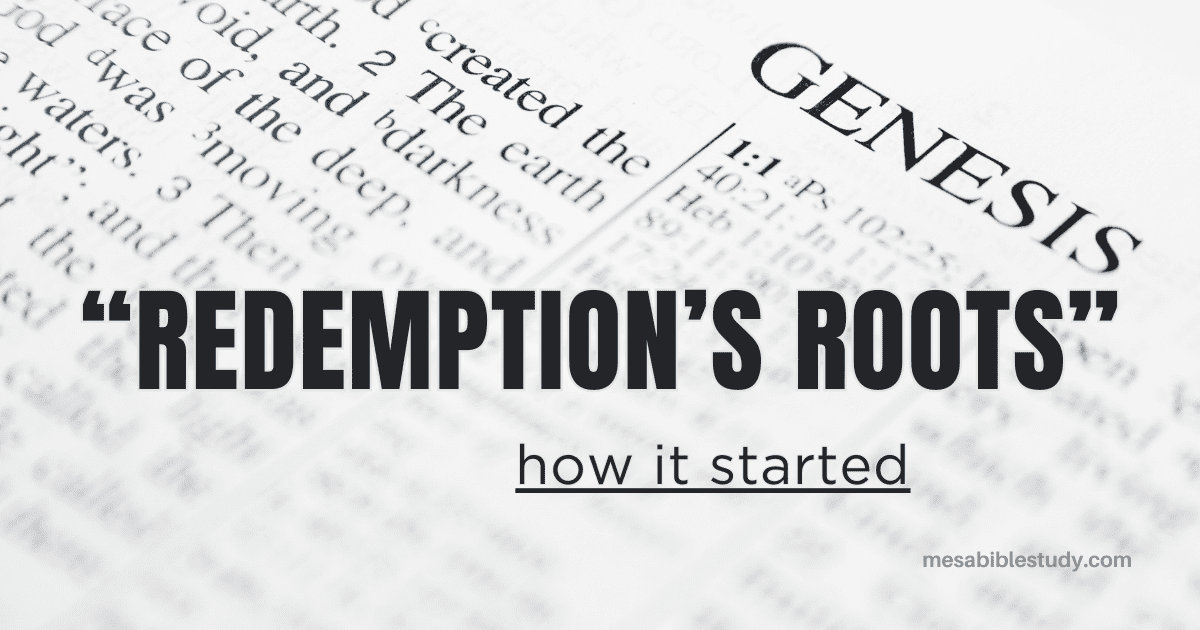A comprehensive understanding of the first 2000 years of biblical history is not just beneficial but essential. Without delving into these foundational years meticulously detailed in Genesis chapters 1–11, individuals will find themselves unable to unravel the progression of God’s redemptive plan. This lack of foundational knowledge will lead to a mishmash of scripture, preventing individuals from rightly dividing the word of truth. It’s a pivotal truth: without grasping the initial 2000 years, the unfolding of the rest of scripture will be left to rely on man’s ideas (denominational beliefs and creeds), made up by mixing all of scripture to fit a man-made prescribed theology, a historical fact observed in much of Christendom. The call to rightly divide the Word of Truth is a call to understand the chronological and theological progression that God has meticulously and so carefully laid out in His Word.
To be a good Bible student, we must know and understand how everything started. To do that, we must study the book of Genesis. All of it, but it is crucial to understand the first eleven chapters of Genesis and what God does in the very next chapter, Genesis chapter 12. Why? Two reasons:
Number one: the first 2000 years of Biblical history (out of 6,000) are packed into the first eleven chapters (out of 66 chapters) of the Bible.
Second: What God does in the very next chapter, chapter 12 of Genesis, sets the theme for all scripture moving forward.
Below is a summary of the key events that occurred in the first eleven chapters of the Bible, which covered a period of 2000 years from approximately 4000 BC to 2000 BC, from Genesis 1:1 to Genesis 12:1-3.
But first:
‘For whatever things were written before were written for our learning, that we through the patience and comfort of the Scriptures might have hope.’
Romans 15:4
‘All Scripture is given by inspiration of God, and is profitable for doctrine, for reproof, for correction, for instruction in righteousness, that the man of God may be complete, thoroughly equipped for every good work.’
II Timothy 3:16-17
‘Study to shew thyself approved unto God, a workman that needeth not to be ashamed, rightly dividing the word of truth.
2 Timothy 2:15
The Bible is a progressive revelation; it wasn’t all dealt out at once to Adam and Eve, Abraham, Moses, Isaiah, Daniel, or the apostle Peter. God is the same and will never change, but the instructions He gave mankind for salvation and how to worship Him changed throughout Biblical history.
It is important to understand that for the first 2000 years, God dealt with all mankind directly; they were one race and spoke one language (Genesis 11:1). There was no written law, doctrine, or instructions on how to worship God. It was all based on mankind’s conscience: when a person sinned, they were to bring God a blood sacrifice (the instructions given to Cain and Abel) by faith. And it was their faith that saved them, just like it does for us today.
*Highly recommend using the Bible timeline to see exactly when these events occurred, to see what came before and what came after, and to see where we are today.

God creates the heavens and the earth – Genesis 1:1
God creates man and gives mankind dominion over the earth – Genesis 1:26-28, 4000 BC – #1 on the timeline
The fall of man (Genesis 3:6) – #2 on the timeline
Adam’s fall (sin and death enter the world), and all mankind born of Adam is now separated from God because of sin. “We sin not because we break God’s law; we sin because we are born sinners, sons and daughters of Adam.” So it is because we are born with a sin nature that we are prone to sin. All mankind is born with the Adamic nature (Romans 5:12).
Satan takes Dominion of the Planet – 2 Corinthians 4:4; Matthew 4:8 – #2a on the timeline
It’s crucial to recall that during Adam and Eve’s time in the Garden, they were in a close relationship with God. They belonged to Him, and their fellowship with Him was flawless. However, with the introduction of sin, that harmonious connection was severed, and God lost them as they fell under the influence of the god of this world, Satan. Without delay, God establishes a means by which He can reconcile humanity back to Himself, and we refer to this process as redemption.
The Promise of a Redeemer: Genesis 3:15–16; Galatians 3:16 – #3 on the timeline
God immediately provides a remedy to the sin dilemma that now separates mankind from Himself. This is the first prophetic utterance in the Bible.
Genesis 3:15 contains a prophecy about the enduring conflict between the forces of Satan and God, particularly focusing on the future appearance of the Redeemer, who is the Son of God, Jesus Christ. This enmity is expressed as a battle between the Seed of the woman, Jesus Christ, and His believers, and the powers of Satan, with the ultimate victory of the woman’s Seed (Jesus Christ) over the serpent (Satan). Which was fulfilled at the cross.
In Galatians 3:16, we find further clarification on the identity of the “Seed of the Woman.” It connects back to the promises made to Abraham and emphasizes that the singular “seed” refers to Christ. This insight allows us to consistently identify the Lord Jesus as the fulfillment of the prophesied Redeemer mentioned in Genesis 3:15. The continuity of this theme underscores the significance of Christ as the central figure in the divine plan of redemption, tying together the Old and New Testament Scriptures.
Cain murders Abel – Genesis 4:8 – #4 on the timline
The first ever case of murder committed on Earth. It was all downhill for mankind from this point forward until the flood.
The Flood – Genesis 6:3–7 – Date: 2400 BC – #5 on the timeline
God destroyed mankind with the flood because the thoughts in their hearts were only of evil all the time. The whole earth was corrupt and filled with murders. But Noah…
Noah and his Sons – Genesis 6:8 – #6 on the timeline
Out of billions of people on earth before the time of the flood, only one man found grace in the eyes of God: Noah. So God starts over with eight people: Noah, his three sons—Ham, Shem, and Japheth—and their wives. Noah and his sons are blessed by God and commanded to repopulate and fill the earth.
The Tower of Babel – Genesis 11:1-9 – 2200 BC – #7 on the timeline
Two hundred years go by from the time of the flood and God starting over with Noah, and again, mankind rebels against God, and we have the tower of Babel. Under the leadership of Nimrod, all of mankind unites and rebels (in unbelief, no faith) once more against God’s commands to repopulate and fill the earth. They unite in the land of Shinar (Babylon), refusing to fill the earth, wanting to make a name for themselves, and openly defying God’s command. So God comes down and confuses their language (all mankind spoke one language), forcing mankind to scatter across the planet.
Mankind Rebels Again! – Joshua 24:2 & 14 – #8 on the timeline
Another 200 years go by since the tower of Babel, and again, the whole world rebels against God and worships idols and other gods (Joshua 24:2). So God does something different (all preordained; in other words, this was all part of God’s plan, made before time began based on His foreknowledge) and chooses one man, from the line of Shem, Abraham, out of millions to create a new race of people for Himself (Deuteronomy 32:8–9; Isaiah 43:21), the Jewish people.
From this point forward (Genesis 12:1-3; 2000 BC), until God calls Paul to be the apostle to the Gentiles, a timespan of approximately 2000 years, God will no longer deal with all mankind directly like He did the previous 2000 years, but instead, He will reveal Himself only to His chosen people, a race of people created for Himself, the Jewish people.
It is crucial to study and comprehend the first 2000 years of biblical history to clearly see the progression of God’s plan of redemption.
Quick Look at the Next 2000 Years “Jew Only”
Between Genesis 12:1 and Acts 9, (or between 2000 BC and 37-40 AD), there is no gospel or “good news” extended to the Gentile world (Ephesians 2:11–12). Throughout these 2000 years, in which God exclusively interacted with the nation of Israel (Romans 3:1-2; Psalms 147:19-20; Deuteronomy 4:5-8; Romans 9:4; Acts 11:19), only nine Gentiles found salvation. From Genesis 12 until the appointment of the apostle Paul, God’s revelations were confined to the nation of Israel under covenants. The Gentile world received no message of salvation or doctrinal guidance during this period. God’s focus was on preparing His chosen people to eventually serve as the conduit for salvation to the pagan Gentile world.
The next post will cover the next 2000 years. From Abraham to Paul.

0 Comments